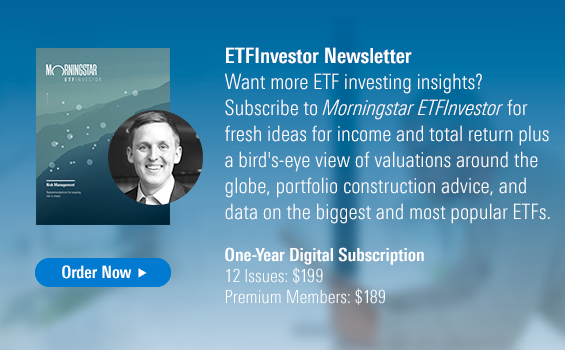Low-Cost Exposure to the Consumer Discretionary Sector
Its narrow focus and sector concentration make this ETF best-suited for use as a tactical tool to complement a diversified portfolio.
Because of its narrow focus and sector concentration, this ETF is best treated as a tactical satellite holding to complement a diversified portfolio. It's suitable for investors looking to bulk up their exposure to consumers' cyclical buying behavior, which tends to be tied to employment rates, consumer confidence, and income.
The Select Sector SPDR ETFs tend to have high-quality portfolios as they draw from the S&P 500 and have a very large-cap tilt. The firms they hold also are high-quality because they have durable competitive advantages and strong profitability.
Consumer discretionary firms are more volatile than the broader market. During the past 10 years, this ETF has had a standard deviation of 18.3% compared with the S&P 500's 15.3%. That places this ETF between two large and competing consumer discretionary ETFs: During that same period,
Fundamental View The University of Michigan's consumer sentiment index registered its highest reading in 10 years in December 2016, owing to a post-election surge in optimism. A strong job market has also contributed to consumer confidence.
The shift to online shopping is accelerating. Amazon.com has continued to boost its fulfillment capabilities while also remaining a formidable competitor from a pricing standpoint. Some traditional retail business models, such as home improvement and auto-parts retail, have characteristics that insulate them from e-commerce competition, such as valuable salesperson help, immediacy of need, and the specialized nature and diversity of products. Other areas of retail, such as toys, office supplies, and consumer electronics, should expect to see continued price compression as consumers shift to e-commerce.
Although almost all of XLY's holdings are U.S.-based, many of these firms have significant operations overseas. Amid macroeconomic worries in China, many investors fear companies' prospects for selling goods to China. However, Morningstar's equity analysts believe that the high end of consumption in China--middle- and upper-income consumers--can outpace the overall Chinese economy in the long run. Morningstar's analysts believe this can happen owing to increased investment in private businesses, saving rates and increased access to credit, increased government share of social welfare and healthcare costs, better investment returns for the middle class, and further returns for China's upper class.
Media firms make up 26% of XLY. However, very little of XLY's media stake is invested in publishing and TV companies. Instead, XLY holds a raft of entertainment firms and cable network owners, such as Walt Disney,
Portfolio Construction XLY follows a full replication strategy and holds every consumer discretionary stock in the S&P 500 at market-cap weightings. The sector makes up about 13% of the broader S&P 500. Sticking to S&P 500 companies provides an initial screen for quality, as holdings must meet the standards of the S&P selection committee. The fund makes dividend distributions on a quarterly basis. As one of the Select Sector SPDR ETFs, XLY follows S&P's rules for index construction. S&P has the flexibility to make changes to the S&P 500 at any time as needed, with no regularly scheduled reconstitution. Then, a company's stock is assigned to a particular Select Sector index on the basis of its sales and earnings composition and on the sensitivity of its stock price and business results to the common factors affecting other companies in each Select Sector index. Under the rules, every constituent in the S&P 500 is assigned to a particular Select Sector index, and no company can be included in more than one index.
Fees The fund's 0.14% expense ratio is low, although there are cheaper alternatives. Vanguard Consumer Discretionary ETF charges slightly less, at 0.10%, and Fidelity MSCI Consumer Discretionary Index ETF FDIS charges 0.08%. XLY lagged its benchmark by 18 basis points during the past year.
Alternatives
For comparable exposure to discretionary consumer spending, Vanguard Consumer Discretionary ETF VCR is better diversified and cheaper with a 0.10% fee. It holds 384 firms. A pricier ETF with slightly different exposure is iShares U.S. Consumer Services IYC (0.44% expense ratio), which unlike XLY and VCR holds some defensive retailers like
Fidelity MSCI Consumer Discretionary ETF FDIS is an inexpensive ETF, with a 0.08% fee. However, FDIS has fewer assets than competing ETFs, which could make it more expensive to trade. FDIS tracks a slightly different index--the MSCI USA IMI Consumer Discretionary Index--while VCR tracks the MSCI US Investable Market Consumer Discretionary 25/50 Index. The indexes are very similar, with nearly identical weighting schemes, similar numbers of holdings, and minimal differences in holdings.
IShares Global Consumer Discretionary RXI (0.47%) offers international consumer discretionary exposure but overweights the automotive industry; RXI's top 25 holdings include
Nevertheless, the performances of the above-mentioned ETFs are very highly correlated.

Disclosure: Morningstar, Inc. licenses indexes to financial institutions as the tracking indexes for investable products, such as exchange-traded funds, sponsored by the financial institution. The license fee for such use is paid by the sponsoring financial institution based mainly on the total assets of the investable product. Please click here for a list of investable products that track or have tracked a Morningstar index. Neither Morningstar, Inc. nor its investment management division markets, sells, or makes any representations regarding the advisability of investing in any investable product that tracks a Morningstar index.

/s3.amazonaws.com/arc-authors/morningstar/a90ba90e-1da2-48a4-98bf-a476620dbff0.jpg)
/d10o6nnig0wrdw.cloudfront.net/04-18-2024/t_34ccafe52c7c46979f1073e515ef92d4_name_file_960x540_1600_v4_.jpg)
/d10o6nnig0wrdw.cloudfront.net/04-09-2024/t_e87d9a06e6904d6f97765a0784117913_name_file_960x540_1600_v4_.jpg)
/cloudfront-us-east-1.images.arcpublishing.com/morningstar/T2LGZCEHBZBJJPPKHO7Y4EEKSM.png)
:quality(80)/s3.amazonaws.com/arc-authors/morningstar/a90ba90e-1da2-48a4-98bf-a476620dbff0.jpg)